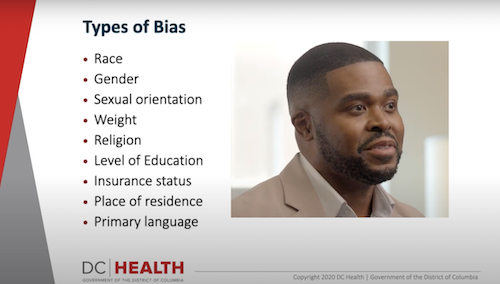Health Systems Administration Department Helps Create Implicit Bias Education Module for DC Department of Health

Dr. Christopher King in an image from the module’s introduction. He noted he is pleased to see this new project come to fruition since education about implicit bias was among the recommendations of the 2020 report, Health Disparities in the Black Community: An Imperative for Racial Equity in the District of Columbia, which the School of Nursing & Health Studies produced and for which King served as lead author.
September 29, 2021 – A new educational module on implicit bias is being offered by the District of Columbia Department of Health thanks, in part, to the creativity and expertise of the Department of Health Systems Administration at the School of Nursing & Health Studies.
The module, “Implicit Bias: A Practical Guide for Healthcare Settings,” which offers continuing education credit, seeks to engage participants in active introspective about their personal biases, the way the health of individuals can be harmed by biases, and how such bias occurs within hospitals and other health care environments.
“Heightening individual awareness and fostering organizational cultures with systems to mitigate bias is key to decreasing risks of medical errors, building trust, and promoting patient engagement,” said Dr. Christopher King, chair of the Department of Health Systems Administration. “The modules illuminate the importance of this work.”
King is a faculty expert in the video-based module, along with Dr. Deliya Wesley, senior director of health equity at Mathematica.
Student Participation

Dr. Deliya Wesley is, along with King, one of the module’s faculty experts.
King noted the department regularly engages students on important projects and partnerships like this, including the development of Health Disparities in the Black Community: An Imperative for Racial Equity in the District of Columbia, A Review of Health and Socioeconomic Disparities among Older Black Adults in the District of Columbia, and MedStar Health’s 2021 community health needs assessment.
Karan Buddala (NHS’23), a health care management & policy major, took part in the latest project and said he valued offering solutions to the social determinants concepts, including racism and discrimination, discussed in class settings.
“What I loved most about this project was its medium of delivery,” Buddala said. “Presenting common interactions through film forces [health] providers and staff to relate to and reckon with their own similar experiences, and whether they have acted upon their implicit bias themselves.”
DC Health noted that this module, the second they have offered, covers the topic through multiple scenarios that seek to recreate “realistic situations that take place in health care settings.”
“These interactions may take place at any point during a patient’s care, from a scheduling phone call to the recording of symptoms, and these interactions can even take place amongst coworkers,” the agency added. “This implicit bias module recreates health care encounters and provides learners with concrete examples so that they may lead the change in creating healthier work environments.”
‘Improving Health Equity’

King in the introductory video on a slide discussing types of bias (Image copyright DC Health)
Buddala said the experience has been a positive one for him. “Producing work that can create real change is something that is very important to me, and I am grateful to have been a part of a project focused on improving health equity in the District,” he said.
In addition to Wesley and Buddala, King shared that Danielle Simcic, associate director for graduate studies in the department, and Maricarmen Barron Esper, a master’s degree student in international development policy at the McCourt School of Public Policy, took part. He, too, complimented the DC Department of Health for their commitment.
“This training is a contribution to the Department of Health’s commitment to a health care delivery system that values and respects the unique identities of each and every resident,” he said.
By Bill Cessato
